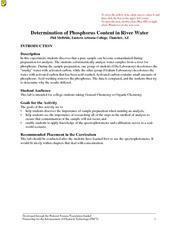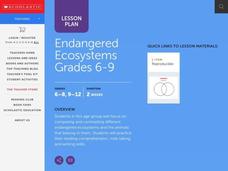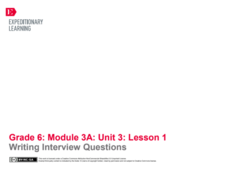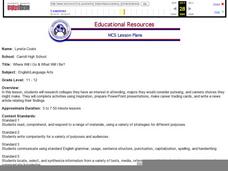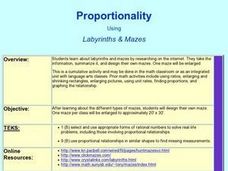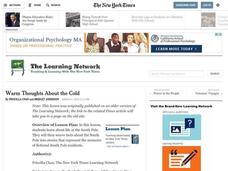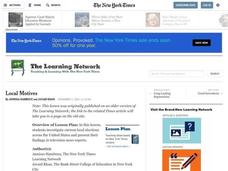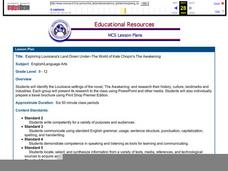Curated OER
Cite Your Sites!
The New York Times article “Lessons in Internet Plagiarism,” launches a look at how the Internet has increased the prevalence of plagiarism. The richly detailed lesson includes warm-up and wrap-up activities, discussion questions,...
Curated OER
Life and Art of Pablo Picasso
Art history projects can be a lot of fun. Budding art historians research the life, art, and times of Pablo Picasso, visit the local art museum, and create a multimedia presentation showcasing his art and personal history. Handouts,...
Curated OER
Don't Believe the Hype
Are hand sanitizers good for you? What about the environment? Research the science behind commonly used cold medicines. The class reads an article, creates a product poster, and conducts independent research on product claims made by...
Curated OER
Determination of Phosphorus Content in River Water
Divide your chemistry or environmental science class into two groups. Each group tests water samples from a river for the concentration of phosphorus using a different method. With chemists, you can use this activity as they learn to use...
Curated OER
Endangered Ecosystems
Reading comprehension and note-taking skills are practiced as young ecologists embark on this journey. Explorers visit a website where they will read about three ecosystems that are in danger. They use interactive programs to build a...
Teach Engineering
Electromagnetic Radiation
How can nanoparticles be used in the battle against skin cancer. Class members take on the question as they gather information about electromagnetic radiation, specifically ultraviolet radiation. Pupils learn about the mathematical...
American Physiological Society
Did I Observe it or Infer it?
Take the mystery out of inquiry! When young scientists learn to use their keen powers of observation to make smart inferences about a situation, they are well on their way to understanding what the scientific method is all about. Using...
EngageNY
Writing Interview Questions
And now for the star witness! Scholars take a look at a model newspaper article and discuss the importance of eyewitness accounts. In groups of three, they take turns underlining text from eyewitnesses. They then regroup to talk about...
Curated OER
Let There Be Peace: Nobel Prize Winners
What is the Nobel Peace Prize? After they establish criteria for great leadership, secondary learners read a New York Times article about President Jimmy Carter's acceptance of the Nobel Peace Prize in 2002. Individuals research the...
Curated OER
Direct Effect
Discover the damage that was caused by the terrorist attacks on September 11th with your class. They will learn about the events of that day and the litigation process for damages incurred that day. Their research will cover the various...
Curated OER
Showdown on the Frontier
Especially critical following a series of shootings in schools, theaters, and religious buildings, it's safe to say that we need to evaluate the current laws on gun control. Eighth graders read a New York Times article in order to better...
Curated OER
Up For Renewal
Want to know more about China's energy resources? Scholars will explore renewable resources implemented in China's energy plan. The will discover various types of renewable energy sources and discover how China is taping into these types...
Curated OER
Where Will I Go and What Will I Be?
Help your future college graduates prepare for higher education with this series of lessons. High schoolers complete research projects about the colleges they would like to attend, and create PowerPoint presentations about their careers...
Curated OER
Proportionality Using Labyrinths and Mazes
Conduct research on the Internet about labyrinths and mazes to learn about proportions and ratios. Inquisitive minds design their own maze, one maze is chosen and proportionately enlarged to 20 feet by 30 feet. This is a fun challenge...
Curated OER
Information Overload: Looking at News
How do events reported in mainstream newspapers, on television news, blog posts, and social network sites differ? Ask your class to investigate the way the same news item is presented in the many information sources available. Groups...
Chicago Botanic Garden
Faces of Climate Change
How does climate change affect you? First in a three-part series, the activity focuses on how individuals living around the world are affected by climate change. Individuals take on the role of a given character and share their...
Curated OER
Warm Thoughts About the Cold
“What do you think life is like at the South Pole?” After responding to this journal prompt, class members read and discuss the New York Times article, “At South Pole, New Home for a New Era.” Using resources available from the Times’...
Curated OER
Local Motives
Investigate current local elections across the United States with this New York Times reading activity. Using informational text, middle and high schoolers research local elections and create their own news reports about what they...
Curated OER
A Discourse on the History of Language
Analyze and make inferences from the information used by linguists to construct the evolution of languages. They research different dating techniques to explain how scientists infer age with evidence.
Curated OER
For the Record
Students read a New York Times article in order to examine the importance of cultural artifacts. They create essays from the point of view of one cultural artifact to demonstrate the knowledge they gained by doing research.
Curated OER
Christmas Candy
Here is a tasty topic for a lesson: Christmas candy! Third and fourth graders research classic Christmas candies, then create their very own! They write a descriptive paragraph about their candy, then use KidPix to create an illustration...
Curated OER
Exploring Louisiana's Land Down Under - The World of Kate Chopin's The Awakening.
Visit 19th century Grand Isle, Cheniere Caminada, and New Orleans! Meet the inhabitants, learn about their history and culture, and view landmarks and industries! After reading Kate Chopin’s The Awakening, class groups research the...
Curated OER
Courts in the Classroom: Ritter v Stanton
Students read the case briefs of Ritter v Stanton. They simulate the trial with classmates taking various parts such as appellant, appellee, bailiff, and justices. After conducting a mock argument, they write their own opinion for the case.
Curated OER
Stop the Fighting and Start Uniting
Research current and proposed peace talks around the world with this New York Times lesson, Using the Darfur peace talks in Abuja, Nigeria as a starting point, middle schoolers create a news program on the subject. They propose a future...





